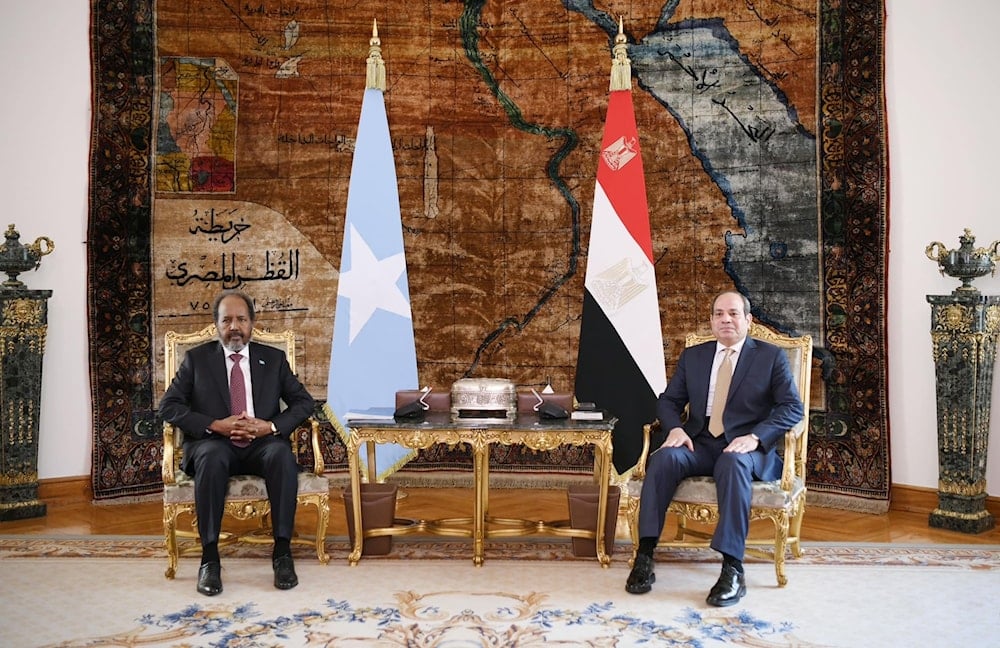El-Sisi vows to defend Somali sovereignty amid high regional tensions
This follows an agreement that granted Ethiopia control over a maritime port in the breakaway region of Somaliland and a military base on the Red Sea, thereby constituting a violation of Somalia's sovereignty.
-

Abdel Fattah al-Sisi reiterated Egypt’s rejection of the deal as a violation of Somalia’s sovereignty, Cairo, Egypt, Jan. 21, 2023 (Egyptian Presidency)
During a joint press conference with Somali President Hassan Sheikh Mohamud in Cairo, Egyptian President Abdel Fattah al-Sisi delivered a stern warning to Ethiopia and Somaliland, that Egypt would not tolerate anyone to violate Somalia's sovereignty.
"Egypt will not allow anyone to threaten Somalia," al-Sisi said, speaking in reference to a contentious maritime agreement between Ethiopia and the breakaway region of Somaliland.
He further reiterated Egypt's rejection of the sea access deal, which Cairo considers a violation of Somalia's sovereignty.
In a "message to Ethiopians", Sisi said: "Somalia is an Arab state in the Arab League with rights, according to the Charter of the League, to collective defense against any threat it faces." El-Sisi said. "We are not threatening anyone; we are stating this for clarity."
"We will not allow anyone to threaten Somalia or infringe upon its territory. I say with utmost clarity, no one should attempt to threaten Egypt's brothers, especially if our brothers have requested our presence alongside them," the Egyptian president said.
Read more: Somalia 'ready for a war' with Ethiopia over breakaway territory
Tensions between Cairo and Addis Ababa have persisted for years, primarily revolving around Ethiopia's mega-dam project on the Blue Nile. Egypt contends that the dam poses a threat to its water security. Last week, Egypt's foreign minister labeled Addis Ababa as "a source of instability in its region."
The strained relations between the two neighboring countries began when the breakaway region of Somaliland signed an agreement with Ethiopia on January 1. This agreement granted Ethiopia control over a maritime port and a military base on the Red Sea, sparking tensions in the region.
In response to the maritime pact, Mogadishu denounced it as an act of "aggression" and declared that there is "no space for mediation unless Ethiopia retracts its illegal MoU and reaffirms the sovereignty and territorial integrity of Somalia."
On Friday, the African Union's Peace and Security Council (PSC) has taken action to prevent further escalation of tensions between Ethiopia and Somalia and asked former Nigerian President Olusegun Obasanjo to lead negotiations and ease the growing conflict.
While appointing Obasanjo as the mediator, the PSC has also called for other countries to refrain from interfering in the situation. In addition, the Intergovernmental Authority on Development (IGAD) held an extraordinary summit in Kampala, Uganda, on Thursday to address the matter.
Somaliland, despite being a former British protectorate with a population of 4.5 million, has not received international recognition for its independence claim.
While Mogadishu opposes Somaliland's pursuit of statehood, the central government's authority in the northern region remains limited, where it operates its own government, security forces, and currency.
Ethiopia, the second most populous country in Africa and one of the largest landlocked nations globally, lost access to the coast after Eritrea seceded and declared independence in 1993 following a three-decade war.
Read more: Somaliland Defense Minister resigns over deal with Ethiopia

 3 Min Read
3 Min Read








